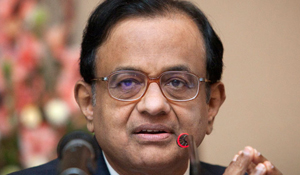New Delhi, Jun 16: Congress leader and former Home Minister P Chidambaram today accused the Modi government of creating a "fake controversy" over two affidavits filed in the Ishrat Jahan case and preparing a "doctored" report on the missing files.
 In a statement after a report suggested that the panel probing to find the missing files related to Ishrat Jahan case "tutored" a witness, Chidambaram said the news report "comprehensively exposed the fake controversy" created by the NDA government on the two affidavits filed by the central government in the case.
In a statement after a report suggested that the panel probing to find the missing files related to Ishrat Jahan case "tutored" a witness, Chidambaram said the news report "comprehensively exposed the fake controversy" created by the NDA government on the two affidavits filed by the central government in the case.
"The moral of the story is that even a doctored report (of the Inquiry Officer) cannot hide the truth. The real issue is whether Ishrat Jahan and three others were killed in a genuine encounter or a fake encounter.Only the trial of the case, pending since July 2013, will bring out the truth," he said.
Home Ministry Additional Secretary B K Prasad led one-man inquiry committee yesterday submitted its report where it said that four of the five missing documents continue to be untraceable.
The panel said that as per the then Joint Secretary, the papers were part of the file which went to his seniors but not found when the file returned to him.Chidambaram was the Home Minister then.
The Congress leader said the news report completely vindicated the position that he had taken on the two affidavits.
The first affidavit (August 6, 2009) disclosed the "intelligence inputs" that had been shared by the central government with the state government.
Chidambaram said Judge S P Tamang in his report (September 7, 2009) found that Ishrat Jahan and three others had been killed in a "fake encounter".
"The report caused an uproar in Gujarat and elsewhere.The first affidavit was misinterpreted and misused to defend the encounter. It was, therefore, necessary to clarify the first affidavit.
"Hence, a 'further affidavit' was filed on September 29, 2009) clarifying that intelligence inputs 'do not constitute conclusive proof and it is for the state government and the state police to act on such inputs'," he said.
Chidambaram said the contents of the 'further affidavit' (especially paras 2 and 5) are absolutely clear and correct. It is unfortunate that most people who commented on the matter had not cared to read the 'further affidavit'.
"The five 'missing' documents completely vindicate the position I had taken. The sequence of events conclusively establish that we had acted in a totally transparent manner," he said.
The former Home Minister said the draft of the 'further affidavit' was vetted by the Attorney General, the highest law officer of the country, before it was filed. The file passed through the hands of the Home Secretary at least 3 or 4 times. Ultimately, the 'further affidavit' was filed in Court on the orders of the Home Secretary.
"Of course, I take full responsibility for filing the 'further affidavit' which was absolutely the correct thing to do," he said.
A report in a newspaper today alleged that inquiry panel chief Prasad not only told a witness the questions he would ask but also suggested to him what answers he should give -- that he had not seen any of the missing documents.





Comments
Add new comment